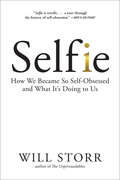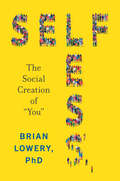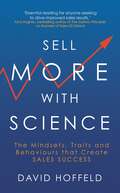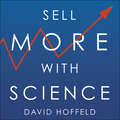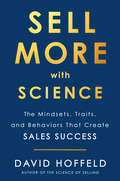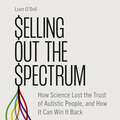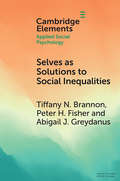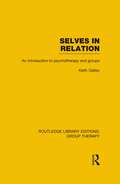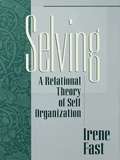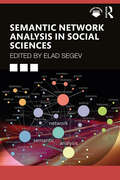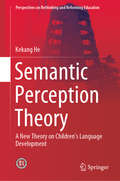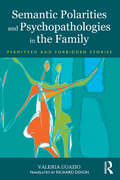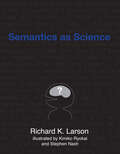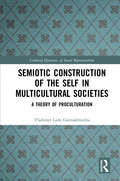- Table View
- List View
Selfie: How We Became So Self-Obsessed and What It's Doing to Us
by Will Storr“An intriguing odyssey” though the history of the self and the rise of narcissism (The New York Times).Self-absorption, perfectionism, personal branding—it wasn’t always like this, but it’s always been a part of us. Why is the urge to look at ourselves so powerful? Is there any way to break its spell—especially since it doesn’t necessarily make us better or happier people? Full of unexpected connections among history, psychology, economics, neuroscience, and more, Selfie is a “terrific” book that makes sense of who we have become (NPR’s On Point). Award-winning journalist Will Storr takes us from ancient Greece, through the Christian Middle Ages, to the self-esteem evangelists of 1980s California, the rise of the “selfie generation,” and the era of hyper-individualism in which we live now, telling the epic tale of the person we all know so intimately—because it’s us.“It’s easy to look at Instagram and selfie-sticks and shake our heads at millennial narcissism. But Will Storr takes a longer view. He ignores the easy targets and instead tells the amazing 2,500-year story of how we’ve come to think about our selves. A top-notch journalist, historian, essayist, and sleuth, Storr has written an essential book for understanding, and coping with, the 21st century.” —Nathan Hill, New York Times-bestselling author of The Nix“This fascinating psychological and social history . . . reveals how biology and culture conspire to keep us striving for perfection, and the devastating toll that can take.”—The Washington Post “Ably synthesizes centuries of attitudes and beliefs about selfhood, from Aristotle, John Calvin, and Freud to Sartre, Ayn Rand, and Steve Jobs.” —USA Today“Eminently suitable for readers of both Yuval Noah Harari and Daniel Kahneman, Selfie also has shades of Jon Ronson in its subversive humor and investigative spirit.” —Bookseller“Storr is an electrifying analyst of Internet culture.” —Financial Times“Continually delivers rich insights . . . captivating.” —Kirkus Reviews
Selfless: A Psychologist's Journey Through Identity And Social Class
by Geoffrey BeattieSelfless is a memoir, reflecting on identity, social class, mobility, education, and on psychology itself; how psychology as a discipline is conducted, how it prioritises objects of study, how it uncovers psychological truths about the world. Geoffrey Beattie takes the reader on a journey through his early life in working-class Belfast, his Ph.D. at Trinity College Cambridge and subsequent academic and professional career, to explore fundamental issues within psychology about social class and social identity. Beattie discusses the difficulties inherent in this process of education and change, and how social background affects how you view academic work and the subject matter of one’s discipline. This book movingly details a life and how it is changed by the processes of education, the psychological pressures when abandoning those close to you, the dissonance within and how it feels and operates. The book takes a critical look at psychology from the other side, and examines the process of becoming ‘selfless’, meaning having little sense of self rather than being overly concerned with the wishes and needs of others. Showing how our early experiences and their influence continues throughout life, Beattie’s emotionally engaging, entertaining, and witty text offers general readers, students, and academics fresh insights into psychology, adaptation and personal change.
Selfless: The Social Creation of “You”
by Brian LowerySocial psychologist and Stanford professor Brian Lowery presents a provocative, powerful theory of identity, arguing that there is no essential "self"—our selves are social creations of those with whom we interact —exploring what that means for who we can be and who we allow others to be. There’s nothing we spend more time with, but understand less, than ourselves. You’ve been with yourself every waking moment of your life. But who—or, rather, what—are you? In Selfless, Brian Lowery argues for the radical idea that the “self” as we know it—that “voice in your head”—is a social construct, created in our relationships and social interactions. We are unique because our individual pattern of relationships is unique. We change because our relationships change. Your self isn’t just you, it’s all around you.Lowery uses this research-driven perspective of selfhood to explore questions of inequity, race, gender, politics, and power structures, transforming our perceptions of how the world is and how it could be. His theory offers insight into how powerful people manage their environment in sophisticated, often unconscious, ways to maintain the status quo; explains our competing drives for deep social connection and personal freedom; and answers profound, personal questions such as: Why has my sense of self evolved over time? Why do I sometimes stop short of changes that I want to make in life? In Selfless, Lowery persuasively breaks down common assumptions and beliefs; his insights are humbling. Despite what many may think, we aren’t islands unto ourselves; we are the creation of the many hands that touch us. We don’t just exist in communities, we are created and shaped by them. Our highs and lows are not only our own but belong to others as well. By recognizing that we are products of relationships—from fleeting transactions to deep associations—we shatter the myth of individualism and free ourselves to make our lives and the world accordingly.
SelfAcceptance: How to banish the self-esteem myth, accept yourself unconditionally and revolutionise your mental health
by Harry BarryIn an age where self-esteem is seen as essential to mental health, we are seeing unprecedented rises in mental health difficulties from depression anxiety, eating disorders and many others. Is there not a dichotomy at play here? Is Self - Esteem (ie 'I live for my rating') a reality at all or simply a myth we are all buying into. In this book bestselling author Harry Barry challenges the conventional wisdom and explores why the terms self-acceptance, self-respect and self-actualization are more helpful in developing positive mental health. In his trademark style he also provides practical examples of what we should all be doing instead to build confidence and reach our full potential.Part 1: The myth of self-esteemPart 2: Debunking the myth of 'low self-esteem'Part 3: Debunking the myth of 'high self-esteem'Part 4: Debunking the myth 'others can dictate my self-esteem'
Self–Acceptance: How to banish the self-esteem myth, accept yourself unconditionally and revolutionise your mental health
by Dr Harry BarryHow to look after your mental wellbeing in times of stressIn an age where self-esteem is seen as essential to mental health, we are seeing unprecedented rises in mental health difficulties from depression anxiety, eating disorders and many others. Is there not a dichotomy at play here? Is Self - Esteem (ie 'I live for my rating') a reality at all or simply a myth we are all buying into. In this book bestselling author Harry Barry challenges the conventional wisdom and explores why the terms self-acceptance, self-respect and self-actualization are more helpful in developing positive mental health. In his trademark style he also provides practical examples of what we should all be doing instead to build confidence and reach our full potential.Part 1: The myth of self-esteemPart 2: Debunking the myth of 'low self-esteem'Part 3: Debunking the myth of 'high self-esteem'Part 4: Debunking the myth 'others can dictate my self-esteem'
Sell More with Science: The Mindsets, Traits and Behaviours That Create Sales Success
by David HoffeldThe groundbreaking system scientifically proven to increase your performance and launch you to unprecedented levels of success.In sales, you need every advantage you can get. In SELL MORE WITH SCIENCE, world-leading expert, David Hoffeld, applies science to selling, sharing his revolutionary three-part system for sure-fire sales success at home, at work, and out in the world.SELL MORE WITH SCIENCE utilizes research studies from social psychology, neuroscience and behavioral economics to reveal actionable insights you can use to grow your sales, achieve more, and stay ahead of the competition. You'll discover: - Two evidence-based mindsets that will help you earn more sales - Seven strategies that will boost your chances of reaching any goal - Powerful principles that will enhance your ability to guide potential clients into positive buying decisions - Ways to win day-to-day interactions - in business and beyond - How to reframe any idea or situation - What it means to sell with integrity - A science-backed formula you can follow to create positive career change - And much more Filled with practical insights and exercises, SELL MORE WITH SCIENCE is a game-changing guide for anyone who wants to take their influence, sales, or career to new heights.
Sell More with Science: The Mindsets, Traits and Behaviours That Create Sales Success
by David HoffeldThe groundbreaking system scientifically proven to increase your performance and launch you to unprecedented levels of success.In sales, you need every advantage you can get. In SELL MORE WITH SCIENCE, world-leading expert, David Hoffeld, applies science to selling, sharing his revolutionary three-part system for sure-fire sales success at home, at work, and out in the world.SELL MORE WITH SCIENCE utilizes research studies from social psychology, neuroscience and behavioral economics to reveal actionable insights you can use to grow your sales, achieve more, and stay ahead of the competition. You'll discover: - Two evidence-based mindsets that will help you earn more sales - Seven strategies that will boost your chances of reaching any goal - Powerful principles that will enhance your ability to guide potential clients into positive buying decisions - Ways to win day-to-day interactions - in business and beyond - How to reframe any idea or situation - What it means to sell with integrity - A science-backed formula you can follow to create positive career change - And much more Filled with practical insights and exercises, SELL MORE WITH SCIENCE is a game-changing guide for anyone who wants to take their influence, sales, or career to new heights.(P) 2022 Penguin Audio
Sell More with Science: The Mindsets, Traits, and Behaviors That Create Sales Success
by David HoffeldThe groundbreaking system scientifically proven to increase your performance and launch you to unprecedented levels of success.Today, in sales, business, and life, you need every advantage you can get. In Sell More with Science, David Hoffeld, the world&’s leading expert on applying science to selling, shares his revolutionary three-part system to experience surefire success at home, at work, and out in the world. Here, Hoffeld utilizes research studies from social psychology, neuroscience, and behavioral economics to reveal actionable insights you can use to grow your sales, achieve more, and stay ahead of the competition. You&’ll discover: • two evidence-based mindsets that will help you earn more sales • seven strategies that will boost your chances of reaching any goal • powerful principles that will enhance your ability to guide potential clients into positive buying decisions • ways to win day-to-day interactions—in business and beyond • how to reframe any idea or situation • what it means to sell with integrity • a science-backed formula you can follow to create positive career change • and much more Filled with practical insights and exercises, Sell More with Science is a game-changing guide for anyone who wants to take their influence, sales, or career to new heights.
Selling Immunity Self, Culture and Economy in Healthcare and Medicine (Critical Approaches to Health)
by Mark DavisSelling Immunity: Self, Culture and Economy in Healthcare and Medicine provides a groundbreaking study of the ways in which immunity shapes life. Through its up-to-date discussion of immunity cultures, alongside detailed real-world examples, the book demonstrates how immunity is enmeshed in concepts of possessive individualism, self-defence and health consumerism. The book explores the rich metaphorical powers of immunity and the life narratives it inspires with reference to the talk of scientists, immunology texts and popular science magazines. The author provides a detailed overview of the ways in which digital media can shape the immune self with reference to cultural and social theories, providing insight into how immunitary knowledge and products are consumed and the benefits and drawbacks this has for healthcare. The book considers the significance of immunity for individuals navigating the threats to health that arise with pandemics and superbugs, with a keen look into how these ideas surface in everyday life across the globe. Finally, the book also discusses economic bases of healthcare technologies bent towards the protection and restoration of immunity. This book is essential reading for professionals within the fields of psychology, sociology, biomedical science, healthcare and other related disciplines. A broader audience will appreciate the book’s attention on the ways immunity is understood to be a personal possession, an object of life craft, and the basis for healthcare consumerism.
Selling Out the Spectrum: How Science Lost the Trust of Autistic People, and How It Can Win It Back
by Liam O'DellWhen trust breaks down, how do we begin to fix it?Set against the controversial history of genetic research into autism, from the Spectrum 10k study led by Professor Simon Baron-Cohen to the legacy of the Andrew Wakefield MMR scandal, this book explores the ways in which autistic people have been let down by science and what needs to be done to build more effective partnerships in the future.Written by leading autistic journalist Liam O'Dell, Selling Out the Spectrum takes a thorough, balanced deep-dive into the issues surrounding the relationship between science and the autistic community, can explores how past damage can be effectively and meaningfully repaired.
Selves as Solutions to Social Inequalities: Why Engaging the Full Complexity of Social Identities is Critical to Addressing Disparities (Elements in Applied Social Psychology)
by Tiffany N. Brannon Peter H. Fisher Abigail J. GreydanusSocial disparities tied to social group membership(s) are prevalent and persistent within mainstream institutions (e.g., schools/workplaces). Accordingly, psychological science has harnessed selves - which are malleable and meaningfully shaped by social group membership(s) - as solutions to inequality. We propose and review evidence that theoretical and applied impacts of leveraging 'selves as solutions' can be furthered through the use of a stigma and strengths framework. Specifically, this framework conceptualizes selves in their fuller complexity, allowing the same social group membership to be associated with stigma, risk, and devaluation as well as strengths, resilience, and pride. We provide evidence that by enacting policies and practices that (a) reduce/minimize stigma and (b) recognize/include strengths, mainstream institutions can more fully mitigate social disparities tied to inclusion, achievement and well-being. Using social groups that vary in status/power we examine implications of this framework including the potential to foster positive, recursive, and intergroup impacts on social inequalities.
Selves in Relation: An Introduction to Psychotherapy and Groups (Routledge Library Editions: Group Therapy)
by Keith OatleyEmotional crises and breakdowns are not things going wrong in individuals’ minds: they are disturbances in their relations with themselves and others. In psychotherapy an attempt is made to resolve such crises through a therapeutic relationship with an individual or in a group. First published in 1984, this book introduces the theory of individual and group therapy, and explains some of its principles in practice. Although there had been a rapid development of ideas in the area of psychotherapy at the time, it was only shortly before the original publication of this book that these had been related to theory. Keith Oatley assesses the influence of cognitive social psychology, psychoanalysis and the existential/phenomenological tradition, and considers the role of emotions, thinking and social interactions in therapeutic transformation. The theory, he argues, must also be related to the research findings on the outcomes of different therapies. This book is for those who study psychotherapy in psychology, psychiatry, counselling and social work – and for anyone who wants to know what psychotherapy was about in the 1980s.
Selving: A Relational Theory of Self Organization
by Irene FastIn Selving: A Relational Theory of Self Organization, Irene Fast invokes the basic distinction between the self as "me" and the self as "I" in order to develop a contemporary theory of the self as subject. In a return to Freud's clinical finding that all psychological processes are personally motivated, she elaborates a notion of the "I-self" that is intrinsically dynamic and relational. Within this conception, our perceiving, thinking, feeling, and acting are not what our self does; rather, they are what our self is. According to Fast, the basic unit of the dynamic I-self --of selving --is a scheme of personally motivated interaction between self and nonself. This notion, which comprehends development (and developmental failure) as a product of integration and differentiation among discrete I-schemes, provides a radically new framework for understanding those dynamic phenomena that Freud included within his structural model of the mind and that contemporary theorists have addressed within object relational perspectives. Via the notion of selving, Fast likewise brings fresh insight to a host of issues that have engaged psychoanalysts and developmental psychologists in recent years. These topics include the place of bodily experience in a relational model of mind, the organization of self as simultaneously individual and relational, the formulation of a constructivist model of psychic structure, among others. Selving is not only a lucid demonstration of how a relational theory of self can reorder clinical observations in conceptually and therapeutically illuminating ways. It is also a convincing demonstration of how a constructivist model emphasizing the interactive nature of meaning-making provides bridges to Piagetian theory, developmental research, and observational infancy studies.
Semantic Network Analysis in Social Sciences
by Elad SegevSemantic Network Analysis in Social Sciences introduces the fundamentals of semantic network analysis and its applications in the social sciences. Readers learn how to easily transform any given text into a visual network of words co-occurring together, a process that allows mapping the main themes appearing in the text and revealing its main narratives and biases. Semantic network analysis is particularly useful today with the increasing volumes of text-based information available. It is one of the developing, cutting-edge methods to organize, identify patterns and structures, and understand the meanings of our information society. The first chapters in this book offer step-by-step guidelines for conducting semantic network analysis, including choosing and preparing the text, selecting desired words, constructing the networks, and interpreting their meanings. Free software tools and code are also presented. The rest of the book displays state-of-the-art studies from around the world that apply this method to explore news, political speeches, social media content, and even to organize interview transcripts and literature reviews. Aimed at scholars with no previous knowledge in the field, this book can be used as a main or a supplementary textbook for general courses on research methods or network analysis courses, as well as a starting point to conduct your own content analysis of large texts.
Semantic Perception Theory: A New Theory on Children's Language Development (Perspectives on Rethinking and Reforming Education)
by Kekang HeBased on an in-depth study of children’s language development theory, this book puts forward the original proposition that semantic perception is the human sixth sense. Presenting a detailed, complete, and scientific argumentation, it asserts that the innateness of semantic perception has a physiological basis and that language acquisition is based on semantic perception, and proposes the idea of a critical period of nurture and language growth. To this end, the book not only contrasts children’s language acquisition processes and the process of adult speech generation and comprehension, but also discusses the ability to read and write, describing this important stage of children’s language development and analyzing semantic perception. Focusing on education and psychology, it also discusses the use of semantic perception theory to instruct teaching and learning. This book is a valuable resource for teachers, researchers, practitioners and graduate students in the fields of educational technology, child development and language learning, as well as anyone interested in children’s language development.
Semantic Polarities and Psychopathologies in the Family: Permitted and Forbidden Stories
by Valeria UgazioThe gap between psychotherapeutic practice and clinical theory is ever widening. Therapists still don’t know what role interpersonal relations play in the development of the most common psychopathologies. Valeria Ugazio bridges this gap by examining phobias, obsessive-compulsions, eating disorders, and depression in the context of the family, using an intersubjective approach to personality. Her concept of “semantic polarities” gives a groundbreaking perspective to the construction of meaning in the family and other interpersonal contexts. At no point is theory left in the wasteland of abstraction. The concreteness of the many case studies recounted, and examples taken from well-known novels, will allow readers to immediately connect the topics discussed with their own experience.
Semantic Priming: Perspectives from Memory and Word Recognition (Essays in Cognitive Psychology)
by Timothy P. McNamaraSemantic priming has been a focus of research in the cognitive sciences for more than thirty years and is commonly used as a tool for investigating other aspects of perception and cognition, such as word recognition, language comprehension, and knowledge representations. Semantic Priming: Perspectives from Memory and Word Recognition examines empirical and theoretical advancements in the understanding of semantic priming, providing a succinct, in-depth review of this important phenomenon, framed in terms of models of memory and models of word recognition. The first section examines models of semantic priming, including spreading activation models, the verification model, compound-cue models, distributed network models, and multistage activation models (e.g. interactive-activation model). The second section examines issues and findings that have played an especially important role in testing models of priming and includes chapters on the following topics: methodological issues (e.g. counterbalancing of materials, choice of priming baselines); automatic vs. strategic priming; associative vs. “pure” semantic priming; mediated priming; long-term semantic priming; backward priming; unconscious priming; the prime-task effect; list context effects; effects of word frequency, stimulus quality, and stimulus repetition; and the cognitive neuroscience of semantic priming. The book closes with a summary and a discussion of promising new research directions. The volume will be of interest to a wide range of researchers and students in the cognitive sciences and neurosciences.
Semantics as Science
by Richard K. LarsonAn introductory linguistics textbook that takes a novel approach: studying linguistic semantics as an exercise in scientific theory construction.This introductory linguistics text takes a novel approach, one that offers educational value to both linguistics majors and nonmajors. Aiming to help students not only grasp the fundamentals of the subject but also engage with broad intellectual issues and develop general intellectual skills, Semantics as Science studies linguistic semantics as an exercise in scientific theory construction. Semantics offers an excellent medium through which to acquaint students with the notion of a formal, axiomatic system—that is, a system that derives results from a precisely articulated set of assumptions according to a precisely articulated set of rules. The book develops semantic theory through the device of axiomatic T-theories, first proposed by Alfred Tarski more than eighty years ago, introducing technical elaboration only when required. It adopts Japanese as its core object of study, allowing students to explore and investigate the real empirical issues arising in the context of non-English structures, a non-English lexicon and non-English meanings. The book is structured as a laboratory science text that poses specific empirical questions, with 25 short units, each of which can be covered in one class session. The layout is engagingly visual, designed to help students understand and retain the material, with lively illustrations, examples, and quotations from famous scholars.
Seminars in Child and Adolescent Psychiatry (College Seminars Series)
by Shermin ImranRecent reports have suggested that child and adolescent mental health in the UK is in crisis. It is more important than ever for informative and up-to-date information on this topic. This updated and revised core resource is essential for those working or training in the field of child and adolescent psychiatry. Featuring new chapters that address key disorders and service provisions, the book covers anxiety disorders, mood disorders, specialised services, and developmental theories. From assessment to outcome, normal development to unusual syndromes and theoretical perspectives to treatment, this is a clear and invaluable overview of the field. Part of The College Seminars series, and directly mapped to the MRCPsych curriculum, this book is a key resource for psychiatric trainees.
Seminars in Forensic Psychiatry (College Seminars Series)
by Harry Kennedy Mary DavorenThis updated edition of Seminars in Forensic Psychiatry is an invaluable guide for consultants and specialist trainees working in forensic psychiatry. Written by leading international contributors, topics include models of care, the management of in-patient violence, forensic psychotherapy, and psychological treatments. The evolution of policy and mental health law is discussed, demonstrating how it has shaped the provision of forensic psychiatry services. Legal aspects include considerations of mentalistic defences in criminal law, mental health law, as well as the law on negligence. The book also includes sections on specialist areas of need, including cultural and gender specific needs, terrorism, stalkers, and sex offenders. Woven into the chapters are practical approaches, and 'how to' guides. The volume ends with advice for each of the transitions in the career of a forensic psychiatrist. A truly practical guide, this is a must-read for psychiatrists and mental health professionals working within a forensic setting.
Seminars in General Adult Psychiatry (College Seminars Series)
by David Kingdon Paul Rowlands George SteinThis long-awaited third edition of Seminars in General Adult Psychiatry provides a highly readable and comprehensive account of modern general adult psychiatry. The text has been fully updated throughout by leading figures in modern psychiatry. This new edition covers developments in the understanding of mental disorders, service delivery, changes to risk assessment and management, collaborate care plans and 'trauma-informed' care. Coverage will also be given to the implementation of the ICD-11 and DSM-5 classification systems, and the impact on diagnosis and treatment. Key features of the previous edition that have been updated include the detailed clinical descriptions of psychiatric disorders and historical sections with access to the classic studies of psychiatry. Additional topics include autism, ADHD and physical health. This is a key text for psychiatric trainees studying for their MRCPsych exams, and a source of continuing professional development for psychiatrists and other mental health professionals.
Seminars in Old Age Psychiatry (College Seminars Series)
by Cornelius Katona Rob ButlerA concise and up-to-date text on the mental health of older people, this second edition is fully updated to reflect changes in technology, competency-based training, guidelines, law and treatments. Each chapter sits alone as an informative, readable and helpful resource for a range of health care professionals. Together the chapters form an essential text that contributes to the rising standards in old age psychiatry. With practical guidelines on clinical management, this edition also includes new sections on topics such as palliative care and migrant health, all written by a global authorship, considering international perspectives. Targeted at qualified and trainee consultant psychiatrists, this text is also useful to other doctors, medical students and healthcare professionals who work with older people.
Seminars in the Psychiatry of Intellectual Disability (College Seminars Series)
by Mike Kerr Mark ScheepersNow in its third edition, this high-quality, informative textbook presents intellectual disability and psychiatric presentation through the ages, to present a clear focus on issues relevant to psychiatric aspects for children and adults, at different stages of life. An ideal text for all psychiatrists, in training and in practice, this up-to-date, comprehensive guide to the understanding of intellectual disability features links to specific psychiatric competencies, vital for those undergoing training. Covering the breadth of psychological, service and biological factors affecting people with intellectual disability, this edition includes updates on a wide range of issues: from psychiatric diagnosis and management, through genetic causation, behaviour, health issues, mortality to delivery of services (historic and current). Key for multiple professional groups, and authored by leading specialists, this text provides the definitive collection of cutting-edge research on the psychiatry of intellectual disability.
Seminars in the Psychotherapies (College Seminars Series)
by Rachel Gibbons Jo O’ReillyThis comprehensive and highly readable book outlines the main psychological therapies used in contemporary clinical practice. It clearly describes the underlying theoretical principles and techniques and with vivid case examples, demonstrates the central role of these treatments in mental health care. The contribution of psychological and psychodynamic ideas to different psychiatric presentations is outlined, including mood disorders, psychosis, self harm and suicide. Other chapters specifically address recent developments, including neuropsychoanalysis, psychedelic-assisted psychotherapy and Open Dialogue. As the chapters unfold this book illustrates how a psychologically informed approach to mental disorder can enrich psychiatric practice by providing a holistic and meaningful understanding of the symptoms of psychological distress. Bringing together ideas from psychiatry and psychotherapy, this is the go-to text for trainees, experienced psychiatrists, and other mental health professionals interested in the psychological and psychodynamic aspects of psychiatry. An essential resource for preparation for the MRCPsych examinations.
Semiotic Construction of the Self in Multicultural Societies: A Theory of Proculturation (Cultural Dynamics of Social Representation)
by Vladimer Lado GamsakhurdiaSemiotic Construction of the Self in Multicultural Societies elaborates on a holistic theory on the self, by means of integrating social representation theory, dialogical self theory and particular ideas from Vygotskyan developmental psychology in one framework. This book sends a humanistic message by indicating the power of inexhaustible human imagination that empowers individuals to strive for knowing the unknown, checking limits of their abilities and challenging (distancing) and at the same time, affectively and semiotically engaging (undistancing and recreating) their heritage cultures. It provides theoretical elaborations and innovations through the example of the case study of Georgian society and particular cases of proculturation. The theoretical and empirical explorations of proculturation experiences allow ways of tracing the rebuilding of the bridges between psychological and anthropological sciences, paving a path towards transdisciplinary approaches. This book will be of great interest to academics, researchers and post-graduate students in the fields of social psychology, semiotics and multicultural studies.
